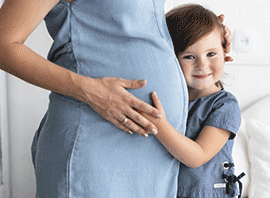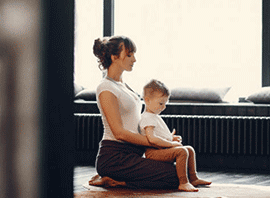“Why is my baby’s forehead so hot?”
For those who are parents for the first time, there’s probably nothing scarier than your baby’s first fever. But there can be many reasons why your baby develops a fever or a high temperature, so don’t panic yet when they suddenly feel hotter than usual. Here are the 3 steps you should take.
Step 1: Take Your Baby’s Temperature!
Baby’s temperature tends to be slightly higher than adults and it can be different from morning to evening. Our body temperatures are usually lower when we wake up and higher during mid-day and night. It is recommended to take your baby’s temperature using a Thermometer in the armpit and here is how you can do so:
- Place your baby on the bed or on your knees.
- Put the thermometer in their armpit.
- Gently hold their arms against their body so the thermometer is kept in place throughout the measurement.
- Check the thermometer instructions - usually you click START and wait 15 seconds for the results to come out.
- Check if the temperature is higher than 38°C or 100°F.
Step 2: Try to Reduce a Fever from Home
If your baby’s temperature is higher than 38°C or 100°F and is indeed having a fever, you should try some home care techniques to help reduce the fever before giving your baby medication recommended by the doctor.
- Drink plenty of water: Keep your baby hydrated! They should drink lots of water to keep their body from dehydration. You can also give them breast milk or formula milk, but remember not to give your baby any fruit juices! Also, breast milk contains antibodies that are good for fighting the infection!
- Don’t overdress them: It is important to keep your baby warm, but overdressing them may cause them to overheat and worsen the condition of their fever. Try to dress them in light layers (or Mamaway’s Temperature Regulating Sleeping Bag!), and put some blankets or snuggles beside them to keep them warm.
- Wash their hands thoroughly: Fevers are usually caused by infections of bacteria or viruses - whatever it’s causing the infection, you wouldn’t want it to spread. Wash your baby’s hands, feet thoroughly to prevent the infection from spreading.
- Offer them a lukewarm bath: Taking a bath will help cool down your baby as the water evaporates from his or her skin. Don’t use cold water, because your baby may get a cold from it or shiver and causes their temperature to rise again. You should not use hot water either because they can potentially overheat your baby. Use lukewarm water that feels temperature neutral to the inner side of your arm.
- Cool the surfaces for your baby: Avoid bedding that are not breathable or too heavy that can overheat your baby. You can try cooling the baby pillow and mattress that have a substantial amount of surface area to help your baby cool down more evenly. To do so, put your Mamaway Baby Pillow in the freezer (remember to put it into a clean plastic bag, don’t splash any water on it) and wait for 20 minutes. The cotton fabric will be slightly cooled, offering your baby cooling effects in a gentle way.
Step 3: Know when you should call the doctor
If your baby’s condition hasn’t improved since the start of the fever, you should consider contacting your doctor and apply medication under recommendation. Seek out your doctor’s opinion when:
- Your baby’s temperature isn’t lowering but rising
- Your 3 - 6 months old baby has a fever of over 39°C or 102°F
- If your 6 - 24 month old baby has a fever of over 39°C or 102°F for more than 1 day
- Your baby’s fever lasted for more than 24 hours
- Your baby’s fever occurs regularly
- Your baby appears tired, energy less, or irritable
- Your baby develops other symptoms like vomiting, rash, lack of appetite
- Your baby is sweating too much and appears dehydrated
Fevers can be caused by bacterial or viral infections, vaccinations, or other illnesses. It is very important to monitor your baby’s temperature and conditions to not let the complication worsen. You should also bring your baby to your doctor at the right time when the symptoms above arise. Last thing, always check with your doctor first before giving any medication to your baby!













Validate your login
Sign In
Create New Account